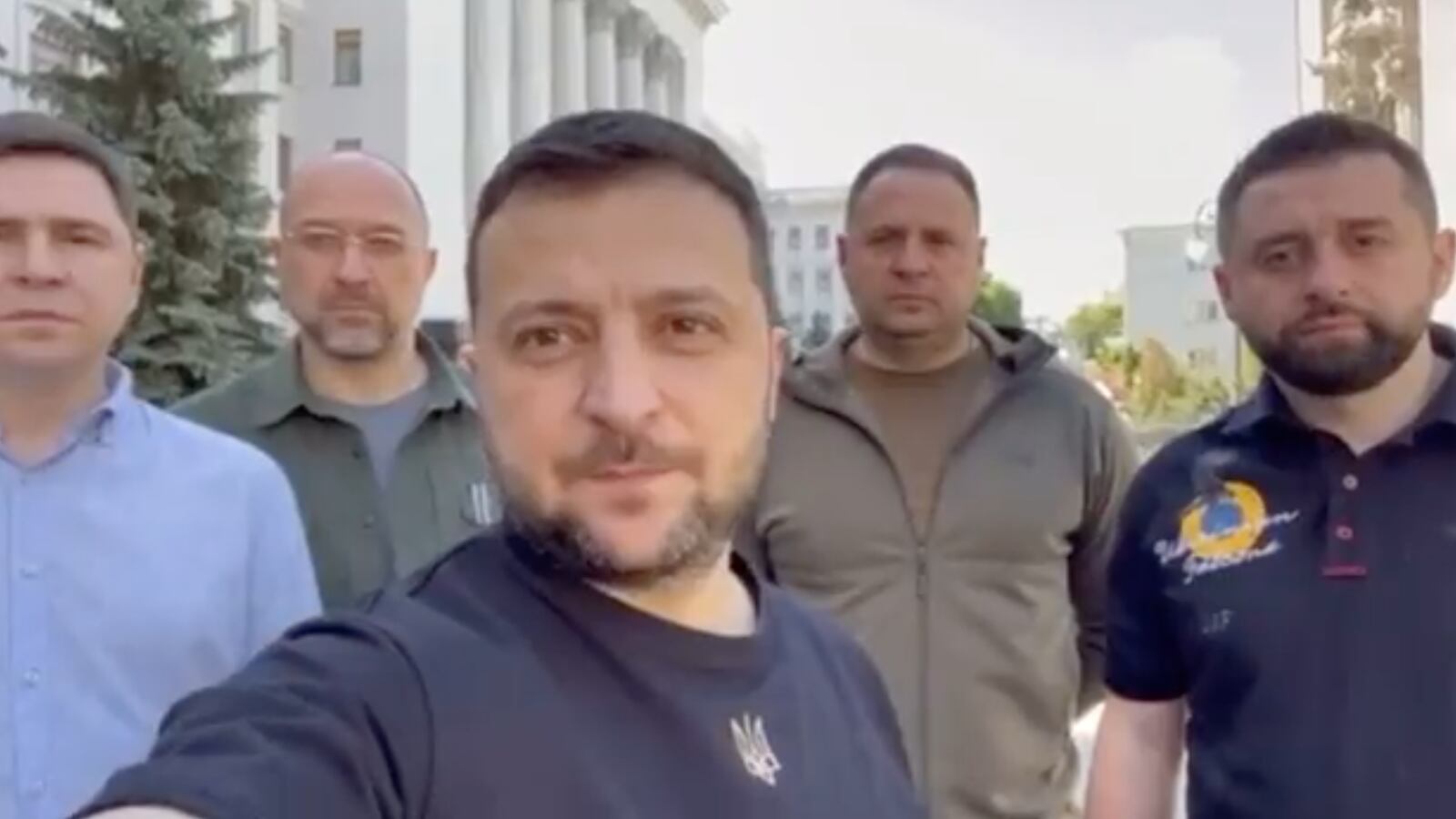Ninety-nine days ago, Volodymyr Zelensky left the presidential palace in Kyiv to shoot a selfie video outside in the street.
The previous day, President Vladimir Putin had sent his troops into Ukraine and the Ukrainian leader was coming under Western pressure to save himself and evacuate the capital before the massive column of Russian armor reached the city.
But no, Zelensky said, Ukraine will fight and he would stay. “I need ammo, not a ride,” he declared.
It was a line that passed immediately into history and helped steel a nation to defend itself against a brutal and illegal invasion. On Friday, Zelensky returned to the same spot outside his Kyiv office to shoot another video and send out the same message: “We’re defending Ukraine for 100 days already. Victory will be ours.”
Experts say that might be true, but not anytime soon and not without a lot more death and destruction. One hundred days in and Vladimir Putin’s war in Ukraine is not going well. For anyone.
What began as just another neo-imperial adventure, a “special operation’” to “denazify” Ukraine and restore Russian authority over its former Soviet neighbor, has spiraled out of all control. Millions have been forced from their homes; tens of thousands have been killed on the battlefield or by Russian bombardment; a great power has been humbled, and turned into a global pariah.
“We just have to be prepared for the long haul,” NATO chief Jens Stoltenberg told reporters after meeting President Joe Biden at the White House on Thursday. “Because what we see is that this war has now become a war of attrition.”
When the invasion began on Feb. 24, Putin and his generals were convinced it would be over in days. Spy chiefs at the FSB assured them Ukrainians would welcome them with open arms. Russian commanders and paratroopers rushed into northern Ukraine, desperate to be the ones to “liberate” Kyiv from its “Nazi” government.
But under Zelensky’s leadership, the Ukrainians fought back, more bravely and more cleverly than anyone had expected—stopping the invaders in their tracks. Russia lost thousands of soldiers, from all ranks, before admitting defeat in the Battle for Kyiv and pulling its forces back.
Two months on from that turning point and the picture is transformed. Having concentrated its forces on securing control of the Eastern Donbas, Russia has been using its superior firepower to blast away resistance and grind out small wins and incremental advances across the battlefield.
Zelensky said this week that Russian forces now control about one-fifth of his country—an area almost equivalent to the state of New York. An even greater area is contaminated by landmines and unexploded ordnance. Twelve million people have been internally displaced, 5 million have fled the country as refugees.
And where Ukraine once helped feed the world, sending 6 million tonnes of grain a month through its Black Sea ports, its vast grain reserves have either been captured and looted by invaders or are blocked because Russia now controls the seas it must pass through.
In in its daily intelligence update on Twitter, the U.K Defence Ministry did its best to encapsulate 100 days of war, beginning with the push towards Kyiv and Russia’s repeated failure to secure control of the key Hostomel airfield, northwest of Kyiv, with its airborne forces.
“Following the failure of the initial plan, through false planning assumptions and poor tactical execution, Russia adapted its operational design to focus on the Donbas,” it said.
“Russia is now achieving tactical success in the Donbas. Russian forces have generated and maintained momentum and currently appear to hold the initiative over Ukrainian opposition.”
The Whitehall analysts say Russia now controls over 90 percent of Luhansk Oblast, one of the two regions that comprise Donbas, and is likely to win complete control in the coming weeks. But that success has come at a significant cost and diverted men and equipment from other fronts on which Russia is now on the defensive.
“Measured against Russia’s original plan, none of the strategic objectives have been achieved. In order for Russia to achieve any form of success will require continued huge investment of manpower and equipment, and is likely to take considerable further time.”
Time may not be on Russia's side. The longer-range HIMARS missile systems promised this week by the United States, together with other advanced weaponry from the U.S. and other Western allies, could indeed be the “game-changer” the Ukrainians have been hoping for, allowing them to turn the tide in Donbas and start to recapture territory along the southern coastal corridor.
The 100-day landmark passed unmentioned in Russian media, after the Kremlin ordered its propagandists and pundits not to “draw attention” to the fact that Putin’s war was becoming so “dragged out,” according to insiders who spoke to Latvian news site Meduza.
In a separate address to his people on Friday, which appears to have been shot from inside the Mariinskyi Palace, Zelensky tried to reassure them that the arrival of ever more sophisticated weapons and new EU sanctions would help Ukraine win.
He accused Russia of not just relentlessly bombing civilian centers in northern Ukraine from across the border but of using Ukrainian men conscripted from areas of the Donbas captured by Russia in 2014 as cannon fodder.
“The Russian army uses all its armed capabilities and does not count people at all. It is especially cynical that in the first line of the offensive the occupiers often use those people who were recruited into the army in the previously occupied territory of the Donetsk and Luhansk regions,” he said.
“Russian soldiers often simply hide behind these so-called mobilized men. The longer the war goes on, the more vile, shameful, and cynical things Russia inscribes in its history, forever.”









